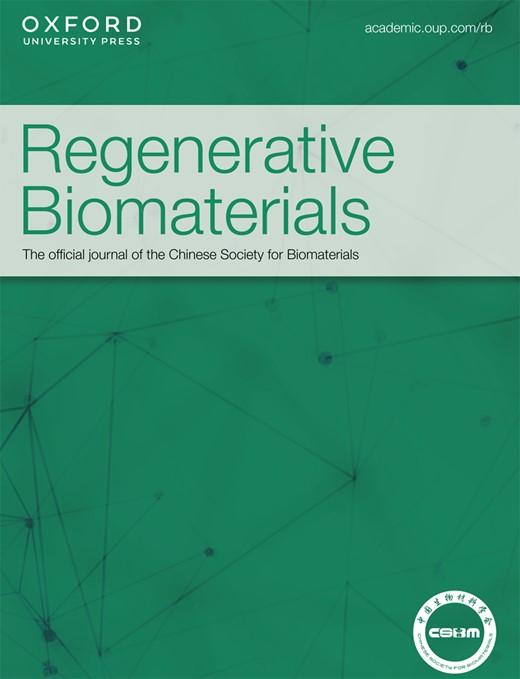无定形姜黄素水凝胶降低手术后宫腔粘连的发生率
IF 5.6
1区 医学
Q1 MATERIALS SCIENCE, BIOMATERIALS
引用次数: 0
摘要
随着宫腔内手术使用率的增加,宫腔内粘连(IUA)的发生率也随之升高。术后常用的物理屏障方法,如球囊和其他填充物,效果有限,甚至可能对残存的子宫内膜组织造成进一步损伤。在此,我们以 Pluronic F127/F68 为药用辅料,以姜黄素为天然活性分子,开发了一种可注射的热敏性水凝胶。该水凝胶有效解决了姜黄素的溶解性和生物利用率低的问题。体外药物释放试验表明,无定形姜黄素水凝胶可促进姜黄素的溶解和持续释放。体外实验显示,水凝胶具有很高的生物相容性,能够促进血管形成,同时抑制纤维化因子 TGF-β1 的表达。为了评估预防宫腔粘连的效果,研究人员使用 IUA 大鼠进行了体内实验,并将其与第三类医疗器械--新型交联透明质酸凝胶(NCHA)进行了比较。研究结果表明,姜黄素水凝胶在改善子宫内膜再生、增加子宫内膜供血、减少纤维蛋白异常沉积等方面的效果优于 NCHA 组,从而能更有效地防止宫腔内粘连。这项研究为治疗和预防 IUA 提供了一种很有前景的策略。本文章由计算机程序翻译,如有差异,请以英文原文为准。
Amorphous curcumin-based hydrogels to reduce the incidence of Post-Surgical intrauterine adhesions
The incidence of intrauterine adhesions (IUA) was raised accompanied by the increasing utilization of intrauterine surgery. The postoperative physical barrier methods commonly used, such as balloons and other fillers, have limited effectiveness and may even cause further damage to the remaining endometrial tissue. Herein, we developed an injectable thermosensitive hydrogel using Pluronic F127/F68 as pharmaceutical excipients and curcumin as a natural active molecule. The hydrogel effectively addresses solubility and low bioavailability issues associated with curcumin. In vitro, drug release assays revealed that the amorphous curcumin hydrogel promotes dissolution and sustained release of curcumin. In vitro experiments reveal high biocompatibility of the hydrogel and its ability to enhance vascular formation while inhibiting the expression of fibrotic factor TGF-β1. To assess the effectiveness of preventing intrauterine adhesions, in vivo experiments were conducted using IUA rats and compared with a class III medical device, a new-crosslinked hyaluronic acid gel (NCHA). According to the study, curcumin hydrogel is more effective than the NCHA group in improving the regeneration of the endometrium, increasing the blood supply to the endometrium, and reducing the abnormal deposition of fibrin, thus preventing intrauterine adhesion more effectively. This study provides a promising strategy for treating and preventing IUA.
求助全文
通过发布文献求助,成功后即可免费获取论文全文。
去求助
来源期刊

Regenerative Biomaterials
Materials Science-Biomaterials
CiteScore
7.90
自引率
16.40%
发文量
92
审稿时长
10 weeks
期刊介绍:
Regenerative Biomaterials is an international, interdisciplinary, peer-reviewed journal publishing the latest advances in biomaterials and regenerative medicine. The journal provides a forum for the publication of original research papers, reviews, clinical case reports, and commentaries on the topics relevant to the development of advanced regenerative biomaterials concerning novel regenerative technologies and therapeutic approaches for the regeneration and repair of damaged tissues and organs. The interactions of biomaterials with cells and tissue, especially with stem cells, will be of particular focus.
 求助内容:
求助内容: 应助结果提醒方式:
应助结果提醒方式:


